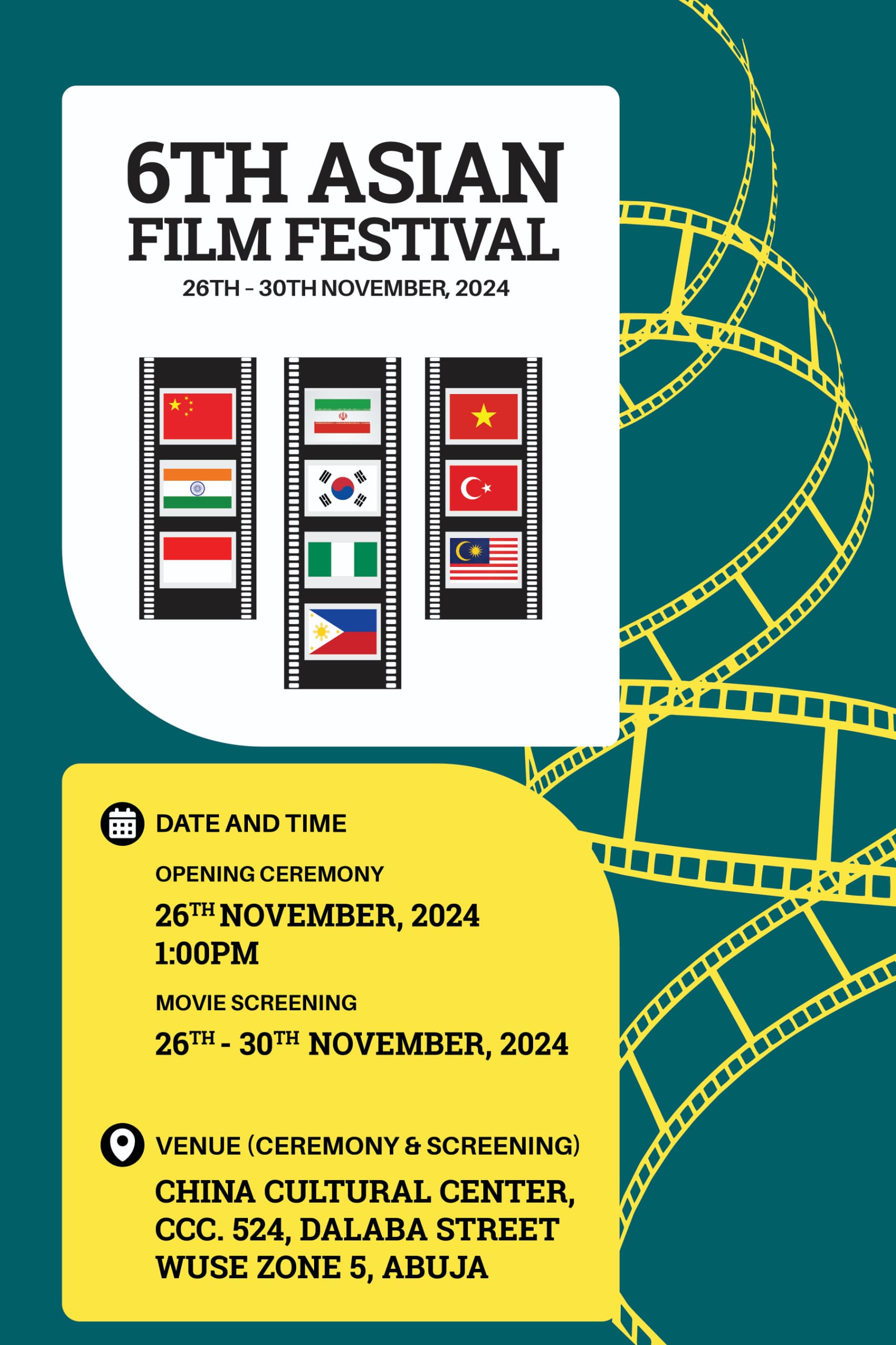The Sixth Asian Film Festival to be Held in Abuja
The Sixth Asian Film Festival will take place from November 26 to 30, 2024, at the China Cultural Center in Abuja, the capital of Nigeria. The event will feature participation from a diverse group of Asian countries, including the Islamic Republic of Iran, the People's Republic of China, the Republic of India, the Republic of the Philippines, the Republic of Turkey, Malaysia, the Republic of Korea, the Kingdom of Thailand, and the Socialist Republic of Vietnam. Additionally, Nigeria will be attending as a special guest.

The Sixth Asian Film Festival to be Held in Abuja
The Sixth Asian Film Festival will take place from November 26 to 30, 2024, at the China Cultural Center in Abuja, the capital of Nigeria. The event will feature participation from a diverse group of Asian countries, including the Islamic Republic of Iran, the People's Republic of China, the Republic of India, the Republic of the Philippines, the Republic of Turkey, Malaysia, the Republic of Korea, the Kingdom of Thailand, and the Socialist Republic of Vietnam. Additionally, Nigeria will be attending as a special guest.
Initiated by the Islamic Republic of Iran, the festival aims to foster cultural and cinematic cooperation among Asian nations. Like previous editions, this year's event offers a platform to showcase the rich cultural diversity of Asia, facilitate the exchange of ideas, and present cinematic masterpieces from across the continent.
Iran’s Prominent Presence with the Film "Damascus Time"
As in all five previous editions, Iran will participate in this year’s festival with the highly acclaimed film Damascus Time (2018), directed by Ebrahim Hatamikia. The film tells the story of Younes and Ali, a father-and-son pilot duo on a mission to rescue innocent civilians under the control of the terrorist group ISIS in Syria. However, during the mission, they are captured by ISIS. With its powerful human, social, and political themes, the film vividly portrays Iran’s efforts in the fight against terrorism.
Iran’s Role in the Fight against Terrorism
Iran has long been one of the primary victims of terrorism in the Middle East and has played a crucial role in combating groups like ISIS. Dr. Alireza Mohammadi Nigjeh, a seasoned Iranian producer currently working on a 3D animated project in collaboration with a Nigerian team, commented on Damascus Time: "This film is not just a cinematic piece but a testament to Iran’s sacrifices and efforts in the fight against terrorism. It highlights Iran’s significant role in preserving regional and global security."
Cinematic and Social Impact of "Damascus Time"
Damascus Time has garnered attention at numerous international festivals, thanks to its advanced technical approach, impactful storytelling, and critical examination of Middle Eastern political realities. The film, beyond its dramatic narrative, conveys universal messages about peace, solidarity, and standing up against injustice.
A Festival for Expanding Cultural Diplomacy
The Sixth Asian Film Festival in Abuja serves as one of the premier cinematic events in Asia, providing an invaluable opportunity to strengthen cultural diplomacy and foster artistic exchange among nations. Through the active participation of multiple Asian countries, the festival emphasizes the power of cinema to create connections beyond borders and promote mutual understanding between diverse cultures.
The Sixth Asian Film Festival in Abuja not only showcases outstanding cinematic works from across Asia but also acts as a bridge for fostering deeper cultural, social, and political cooperation among nations. This event underscores the transformative power of cinema in facilitating cross-cultural dialogue and enhancing global understanding.
The Significance of Iranian Cinema
Dr. Alireza Mohammadi Nigjeh also remarked on the significance of Iranian cinema: "Iranian cinema, with its profound human narratives, prominent social and political themes, and remarkable technical achievements, is recognized as one of the regional pioneers in the art of filmmaking. It is not only impactful but also deeply conceptual, addressing universal concerns and human issues. By transcending geographical boundaries, it has created a bridge for strengthening cultural diplomacy and conveying valuable humanitarian messages."

Write your comment.